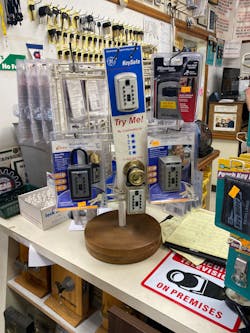When thinking about point-of-purchase (POP) sales, the first thing that pops into mind is all of the Lucky Line and clear-packed products sold at IDN Hardware.
POP refers to an impulsive decision the customer makes while waiting for something. Think of your time waiting in line at a supermarket. That candy or pack of gum you pick up certainly wasn’t the reason you walked in, but now that you see it and think about it, a piece of chocolate for the drive home wouldn’t hurt, and you buy it. That’s an impulse purchase.
In the locksmith business, customers could be waiting in line or simply waiting for keys to be cut or a lock to be rekeyed or repaired. It seems that a good way to increase revenues that could go toward your overhead would be to display items in such a way that they would plant a similar idea in the customer’s head.
We aren’t always aware of the idea that we have a problem that has to be resolved right away, such as something as simple as what you’ll do with the keys you just purchased. In this case, a simple key ring might do or maybe something else. Suddenly you’re reminded that your child requires a combination padlock for school, and, lo and behold, there’s one staring at you in a neat little see-through package.
Although I’m typically on the road seeing customers, I take and enter orders at times. When speaking with certain customers who are reading off of a want list, you know whose orders will include some of those impulse items. Obviously, the customers I’m thinking of have retail locations.
Some pay more attention than others to the placement of such items. They might have different styles in terms of design, but each one has the same thing in mind — adding to the sale at the point of purchase. We recently spoke with a couple of them.
McIntyre’s Locksmith & Lawnmower Shop
One of the customers I thought of was Rich Herder, owner of McIntyre’s Locksmith & Lawnmower Shop in Westfield, New Jersey. Each time he calls to order something, there’s a good chance that there will be a few Lucky Line items on his list, as well as padlocks, hasps and other items that could be purchased in visible packaging. I stopped in to make a sales call and talk a little about his approach regarding POP items.
Locksmith Ledger: Who decides which items are placed in the shop area? How do you decide what to display?
Herder: Primarily I do, but I also take suggestions from the guys who work here. Occasionally, someone will ask for something we don’t have. If it makes sense, I’ll put some [of those items] on the rack, replacing an item that hasn’t sold in a while.
LL: Do you ever see something and think it would sell if you put it out there?
Herder: The remote skins Lucky Line makes are one of the things I knew would sell right away. I’ve been here since 1996 selling those items since then, and I’ve been adding and subtracting as we go.
LL: How has the COVID era affected impulse sales?
Herder: The only way it had any effect on what sold was if I had trouble getting something. We didn’t do anything different when it came to handling items. Now that the mandates are over, we won’t be affected.
Things were quiet when I arrived, but before I knew it, the shop was buzzing with customers. I spoke with Dan, one of Herder’s longtime employees who handles the showroom area at times. Dan, who didn’t want to give out his last name, described how he’ll change things around sometimes for a fresh look. He’s had experience in other work environments and talked about the importance of product placement. It’s similar to what I mentioned earlier about supermarkets — display items strategically, so customers have no choice but to see them and then, perhaps, buy them.
Much of the showroom floorspace at McIntyre’s is taken up by lawn mowers and other landscaping equipment. This would include gas cans. Dan points out how the gas cans were arranged so each one faced the same way in an orderly fashion. This was no accident and brings up an important point about displaying product of any type. Whether it’s gas cans, one small rack of key rings or a wall full of items, it’s important to keep things clean and displayed in a way that customers easily could find things and not wonder how long the items have been there.
At McIntyre’s, smaller items sell quickly and often enough to require daily attention. Much of what this business does is service- and repair-oriented, so customers have ample time to wander around and possibly pick something up they might not have had in mind when they walked in. That’s the idea, right?
Advanced County Locksmith
My next stop was Advanced County Locksmith in Union, New Jersey. Owned by Perry Zranchev, the shop is laid out nicely, with many items visible and ready to be purchased. When I arrived, I spoke with Zranchev’s son, Chris, who, as it turns out, has much to do with how things are arranged around the store.
LL: How do you decide what gets put out for the customers to see and hopefully purchase and how or where it gets placed? Are you displaying things that you believe will sell or items that have been requested?
Chris Zranchev: I think it would be some of both of those. It’s important to listen to your audience, the customers. People are coming in lately with questions about doorbell cameras. We haven’t done cameras yet, but now I’m looking in that direction, because there’s obviously a market for them.
LL: For the purpose of POP sales, would I be correct in saying that customers aren’t walking in asking for a key ring?
Chris Zranchev: That’s correct. Obviously, placement is very important. This is something I’ve focused on very much this past year. For example, [our Gardall wall safes] used to be on the floor. Now we have them up higher, so they catch people’s attention. We’re trying to have as much as possible at eye level.
We try to have on display and ready for purchase a little of everything and listen to what people are asking about. [Schlage BE series push-button locks] are popular, so we make them easy to see.
LL: Chris was explaining what goes into the placement of items in your store.
Perry Zranchev: [My philosophy was] just put the stuff out there and hope it sells. That’s what I do, and then Chris rearranges everything. When Chris started doing this, his first step was to clear out all of the old and discolored stuff — old signs and items in visi-pack that hadn’t sold in years.
LL: That’s a terrific way to begin. I’ve been doing this since 1993 and still see the signs we used to give customers being used. Often, they’re yellow and quite dirty, which isn’t a good look.
Do you sell the Master and American padlocks because they’re on display, or is this also a way to store the items? Does this way of showing product result in sales that wouldn’t have happened otherwise?
Perry Zranchev: Definitely. People come in to get keys cut and start walking around looking at things. Contractors who come in will see things on display and comment that they could’ve used one of these if they knew we had it. The Don-Jo items in clear pack sell because you could see what it is and understand the problem it might solve.
Chris Zranchev: Having stuff like latch protectors on display this way is letting people know there are good solutions to problems they might have. For the everyday home or business owner, it helps a lot to be able to see the item and visualize how it’s used. I try to keep related items next to each other so it isn’t all over the place. This also leads to conversations about other things you might be able to help them with. You never know what it might lead to with a customer.
LL: Has COVID affected sales much?
Perry Zranchev: I don’t think so.
Chris Zranchev: My sister’s a nurse and got to see the reality of COVID’s effects up close. It didn’t have much effect here as far as the handling and placement of merchandise though.
Steve Kaufman has worked for distributors in the locksmith industry since 1993 and worked as a full-time locksmith from 1978 through the 1980s. Kaufman is the sales manager for IDN Hardware out of its Philadelphia location.
Steve Kaufman
Steve Kaufman has worked for distributors in the locksmith industry since 1993 and worked as a full-time locksmith from 1978 through the 1980s. Kaufman is the sales manager for IDN Hardware out of its Philadelphia location.






